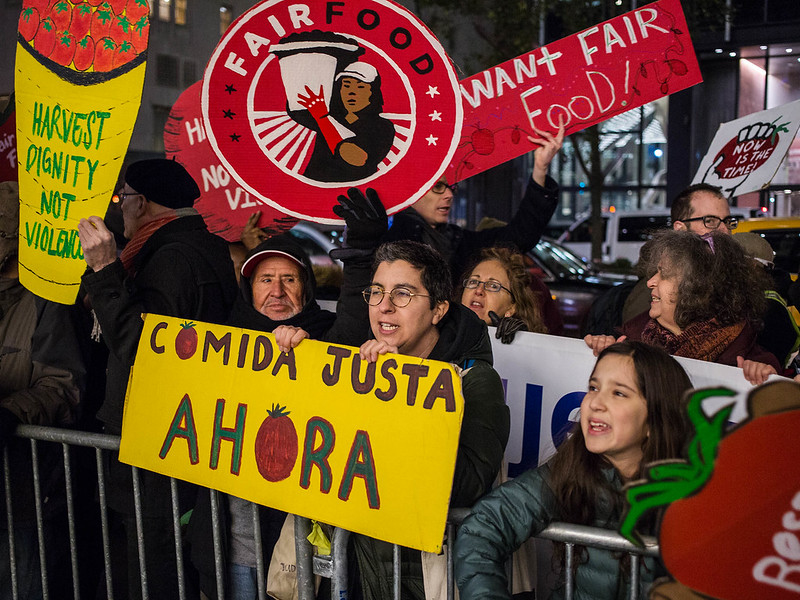Healthy food workers = healthy food system
 March for food and farm worker dignity in New York, 2017 (Working Families Party/Flickr)
March for food and farm worker dignity in New York, 2017 (Working Families Party/Flickr)
The conventional food system is heavily focused on the goal of creating an abundance of cheap food – a goal built on the backs of food workers who are some of the most vulnerable members of our communities.
The health care sector is increasingly taking into consideration the determinants of health. The conditions faced by many food workers – long hours, high stress, and low pay – contribute to poor health outcomes and poor quality of life. To create a sustainable food system and improve health outcomes in our communities we must address conditions for food workers.
In honor of International Food Worker Week (Nov. 23-29), Health Care Without Harm is reflecting on the laborers who make our food system function.
Unprotected by the law
The food system is the largest employment sector in the United States, employing 21.5 million workers. These workers range the full spectrum from U.S. citizens to legal residents, guest workers, and undocumented workers. Regardless of their immigration status, farmworkers and other laborers in the food system are subject to some of the most difficult and dangerous working conditions of any sector.
Most farmworkers are not protected by the National Labor Relations Act or the Fair Labor Standards Act, due to explicit exemptions included in those legislations. As a result, they do not have the right to a minimum wage or overtime pay, they lack workers’ compensation and disability insurance, and are not guaranteed protection for organizing or collective bargaining.
Integral to the food system
Over the past few months, you may have noticed a lot of coverage about immigration and the food system. As WBUR reported, the restaurant industry was hit hard this summer with a shortage of laborers to wait and bus tables and wash dishes. This shortage was in part due to a shortage of visas. The New York Times highlighted the role of immigrants who entered the country illegally in chicken processing facilities across Mississippi. Immigration and Customs Enforcement conducted numerous raids and arrested over 600 individuals at these facilities. A report by CBS news discussed the critical importance of immigrant labor on dairy farms and in vegetable fields as fewer American-born individuals are interested in these physically demanding jobs.
What health care can do
There are a number of groups organizing to protect the rights of farmers and other laborers across the food system. Looking for fair labor certifications, such as Equitable Food Initiative or Food Justice Certified, on the food products you buy can help you know more about how the farmers who grow your food are treated.
Health Care Without Harm and Practice Greenhealth are currently reviewing and revising our “accepted” third-party certifications list to include some that explicitly address food labor and farmworker conditions and will release new guidance in 2020.
Across the country, hospitals are applying their social and economic influence and intellectual resources to address the environmental, social, and economic conditions impacting the health and well-being of people in the communities they serve. These initiatives have the opportunity to protect and support the hardworking people who harvest, process, and serve our food. Let’s make sure they get a seat at the table.
J en Obadia is the Eastern Region Director of Health Care Without Harm's Healthy Food in Health Care program.
en Obadia is the Eastern Region Director of Health Care Without Harm's Healthy Food in Health Care program.
